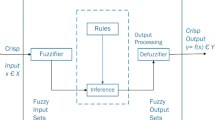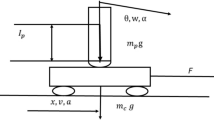Abstract
Fuzzy logic controllers (FLC) have long been successfully implemented for effective tracking control and regulation of nonlinear dynamical systems. The optimization of parameters of a fuzzy logic controller is the focus of research in the domain of evolutionary computation (EC). The parameters include membership functions and rule sets. In this chapter we solve this optimization problem using three different algorithms. These are simple genetic algorithm (SGA), differential evolution (DE) algorithm and univariate marginal distribution algorithm (UMDA). Like simple genetic algorithm, differential evolution is an exceptionally simple, fast, and robust population based search algorithm that is able to locate near-optimal solutions to difficult problems. In contrast, univariate marginal distribution algorithm is a purely probabilistic search strategy over the possible solution space. We have selected two nonlinear control system problems for application. In the domain of process control, control of pH poses a difficult problem because of inherent nonlinearities and frequently changing process dynamics. The efficacy of DE over SGA is shown through the design of FLC for a pH neutralization process. This result is also verified through successful implementation on a laboratory scale pH plant setup. The next problem is the control of an one-link robot manipulator. The fuzzy model of the robot inverse dynamics in conjunction with a fuzzy PD (proportional plus derivative) controller is optimized using univariate marginal distribution algorithm and compared with SGA. Fuzzy UMDA model is found to be more accurate as compared to fuzzy SGA model. However, fuzzy SGA and UMDA controllers do fare well on equal footing and their performances are accurate and robust to model uncertainties.
Access this chapter
Tax calculation will be finalised at checkout
Purchases are for personal use only
Preview
Unable to display preview. Download preview PDF.
Similar content being viewed by others
References
Back T (1996), Evolutionary algorithms in Theory and Practice, Oxford University Press, New York, USA
Behera L, Gopal M, Chaudhury S (1994), Trajectory Tracking of a Robot Manipulator using Gaussian Networks, Robotics and Autonomous Systems, 13: 107–115
Behera L (1995), Neural Controllers for Robot Manipulators, PhD Thesis, Indian Institute of Technology, Delhi
Behera L, Anand KK (1999), Guaranteed Tracking and Regulatory Performance of Nonlinear Dynamic Systems using Fuzzy Neural Networks, lEE Proc. Control Theory and Applications, 146: 484–491
Fogel DB (1995), Evolutionary Computation: Toward a new Philosophy of Machine Intelligence, IEEE Press, Piscataway, NJ, USA
Gu J, Huang X (1994), Efficient Local Search with Search Space Smoothing: A Case Study of the Travelling Salesman Problem (TSP), IEEE Trans. on Systems, Man and Cybernetics, 24: 728–735
Goldberg DE (1989), Genetic Algorithms in Search, Optimization, and Machine Learning, Reading, MA: Addison-Wesley
Gustaffson TK, Waller KV (1992), Nonlinear and Adaptive Control of pH, Ind. Eng. Chem. Res., 31: 2681–2693
Mühlenbein H, Mahnig T (2001), Evolutionary Computation and Beyond, In: Foundations of Real-world Intelligence, ed. Uesaka et al, CSLI Publications, 123–188
Muhlenbein H (1998), The equation of response to selection and its use for Prediction, Evolutionary Computation, 5: 303–346
Homaifar A, McCormick E (1995), Simultaneous Design of Membership Functions and Rule Sets for Fuzzy Controllers Using Genetic Algorithms, IEEE Trans. Fuzzy System, 3: 129–138
Karr CL, Gentry EJ (1993), Fuzzy Control of pH Using Genetic Algorithms, IEEE Trans. Fuzzy Systems, 1: 46–53
Kennedy J, Eberhart RC (2001), Swarm Intelligence, Morgan Kauffman
Lee CC (1990), Fuzzy Logic in Control Systems: Fuzzy Logic Controller, parts I and II, IEEE Trans. Syst. Man Cybern., 20: 404–435
Maiti SN, Kapoor N, Saraf DN (1994), Adaptive Dynamic Matrix Control of pH, Ind. Eng. Chem. Res., 33: 641–646
Mamdani EH (1974), Application of Fuzzy Algorithms for the Control of a Dynamic Plant, Proc. IEEE, 121: 1585–1588
McAvoy TJ (1972), Dynamics of pH in Controlled Stirred Tank Reactor, Ind. Eng. Chem. Res. Process Des. Dev., 11: 1254–1259
Meeden LA (1996), An increamental approach to developing inteligent neural network controllers for robots, IEEE Trans. on Syst. Man Cybern., 26: 474–485
Morgan P (1996), A Clear Look at Fuzzy PI Control, InTech, 50–54
Nordvik JP, Renders JM (1991), Genetic Algorithms and their Potential for Use in Process Control: A Case Study, In: Proc. of the Fourth Int. Conf. Genetic Algorithms, 260–265
Park D, et al (1994), Genetic-Based New Fuzzy Reasoning Models with Application to Fuzzy Control, IEEE Trans. on Syst. Man Cybern., 24: 39–47
Price K, Storn R (1997), Differential Evolution, Dr. Dobb’s Journal, April: 18–24
Qin SJ, Borders G (1994), A Multiregion Fuzzy Logic Controller for Nonlinear Process Control, IEEE Trans. Fuzzy Systems, 2: 74–81
Sastry KKN, Behera L, Nagrath IJ (1999), Differential evolution based fuzzy logic controller for nonlinear process control, Fundamenta Informaticae, 37: 121–136
Tettamanzi A, Tomassini M (2001), Soft Computing: Integrating Evolutionary, Neural, and Fuzzy Systems, Springer-Verlag.
Whitley D, Starkweather T, Bogart C (1990), Genetic algorithms and neural networks: Optimizing connections and connectivity, Parallel Computing, 14: 347–361
Yang JM, Horng JT, Kao CY (2000), A genetic algorithm with adaptive mutations and family competition for training neural networks, International Journal of Neural Systems, 10: 333–352
Zadeh LA (1973), Outline of A New Approach to the Analysis of Complex Systems and Decision Processes, IEEE Trans. Syst. Man Cybern., 3: 28–44
Rights and permissions
Copyright information
© 2004 Springer-Verlag Berlin Heidelberg
About this chapter
Cite this chapter
Behera, L. (2004). Parametric Optimization of a Fuzzy Logic Controller for Nonlinear Dynamical Systems using Evolutionary Computation. In: New Optimization Techniques in Engineering. Studies in Fuzziness and Soft Computing, vol 141. Springer, Berlin, Heidelberg. https://doi.org/10.1007/978-3-540-39930-8_19
Download citation
DOI: https://doi.org/10.1007/978-3-540-39930-8_19
Publisher Name: Springer, Berlin, Heidelberg
Print ISBN: 978-3-642-05767-0
Online ISBN: 978-3-540-39930-8
eBook Packages: Springer Book Archive




